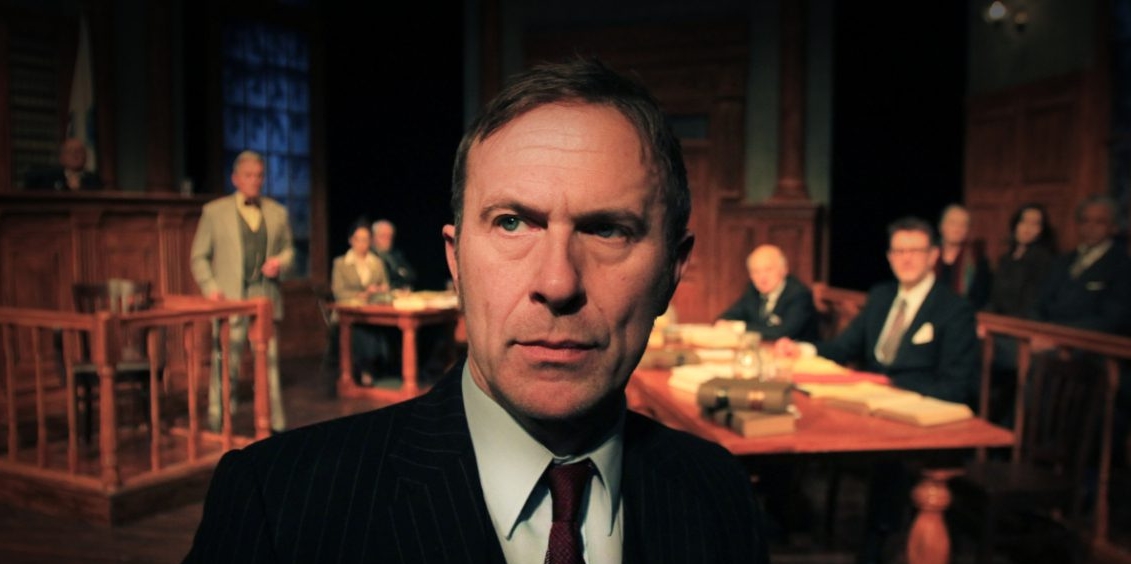I caught the stage production of The Verdict the other day when it came to Oxford towards the end of its extensive national tour. The original, best-selling 1980 novel was written by Barry Reed, a Boston attorney who had specialized in medical malpractice suits. The plot of The Verdict is clearly informed by his legal work. The story centres on an alcoholic lawyer who tries to redeem his unjustly tarnished reputation by taking on a malpractice case against the Boston Catholic diocese and two prominent doctors. A David versus Goliath tale, the film was soon adapted by David Mamet into a film in 1982 that was directed by Sidney Lumet and starred Paul Newman and James Mason as the opposing lawyers. The story was then adapted once more, this time for the stage, by Margaret May Hobbs. She has done a fine job.
The question remains: if you have seen the film do you need to see the stage version? The answer for me is an unqualified “yes”. For a start, this dramatic adaptation works extremely well as an evening of theatre. Jason Merrells playing the part of the main protagonist, Frank Galvin gives a fine central performance worth catching. He plays his character in a manner that is nuanced and extremely appealing while conveying the man’s pain and self-destructive depressiveness. He also conveys clearly the salient fact about the hero of this story: Galvin has been reduced to ambulance chasing and can barely make ends meet but he has a conscience, he cares about justice. Once he visits the young woman who has been brain damaged into a vegetative state by medical negligence, he wants to make the guilty pay not just for the money but because the malpractice must be acknowledge and also learned about to avoid similar future mistakes. There clearly is a limit to his opportunism and there’s a strong morality at the very core of his being.
As the story unfolds and we come to learn of the cynicism of his opposing attorney, J Edgar Concannon, solidly played by Nigel Barber almost as a fake but plausible Spencer Tracy type, we have much to ponder. We also have to consider the role of the Church. Richard Walsh conveys something of the venality and elitist sense of entitlement involved as Bishop Brophy. Vincent :Piirillo ha memorable moments of emotional warmth and comedy as Frank’s aging mentor, Moe Katz; Okon Jones as the medical expert Lionel Thompson is a standout too and adds a layer about confronting racism and snobbery both.
The play makes sense simply because the story is even more tellingly relevant to the issues of our day than when the original book was written. In an era when we have become much more aware of corruption in the Church (for a start consider the film Spotlight, also set in Boston) and in medicine, this story is all even more telling as we watch it unfold. Sarah Shelton as the mother of the victim and Holly Jackson Walters as Natalie Stampanatto have particularly harrowing moments that touch the emotions; Reanne Farley plays her role as Donna St Laurent with convincing duplicity.
The script is impactful, provocative intellectually and morally teasing. The actual stage craft was excellent and imaginative. I liked very much the direction and the designs by Michael Lunney. The inventive first act that split the stage between the hero’s office and a bar with drop-down backgrounds for some of the scene changes and the very realistic courtroom setting were first class. I also liked the fact that the design and staging put the audience in the position of the jury.
I don’t want to give away the surprise plot twists but they were effective when they came. Altogether a satisfying evening of theatre that was also thought provoking , moving and memorable.

